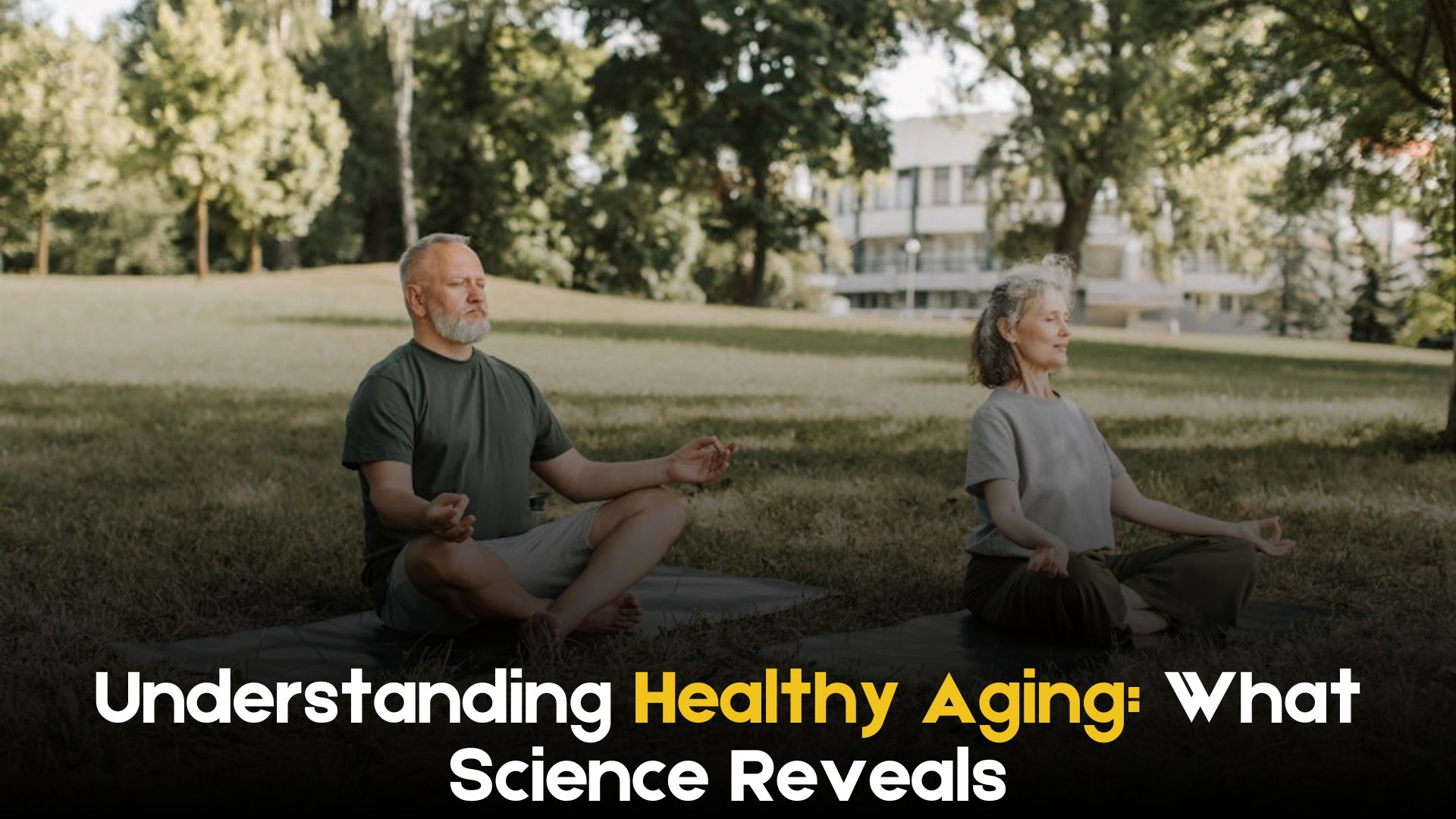Aging is an inevitable journey marked by life’s accumulated experiences, memories, and wisdom. However, growing older doesn’t have to mean a decline in health and vitality.
Healthy aging, as research shows, is a combination of lifestyle choices and proactive health management that can extend our quality of life.
While genetics play a role, scientific findings reveal that factors like physical activity, a balanced diet, mental health care, and regular medical check-ups significantly influence our ability to live healthily in our later years.
Here’s what science tells us about healthy aging and the practical steps we can take to achieve it.
1. The Role of Physical Health: Staying Active as You Age
One of the pillars of healthy aging is maintaining physical fitness. Studies highlight that consistent physical activity not only extends lifespan but also improves the quality of those years by reducing risks of chronic diseases, mobility issues, and disability. Regular exercise, from brisk walking to strength training, contributes to a healthier heart, stronger muscles, and better weight management, which are essential for staying active and independent.
Research Findings on Exercise and Aging:
A pivotal study involving adults over 40 found that those who walked 8,000 steps or more each day had a 51% lower risk of mortality from all causes compared to those who walked just 4,000 steps. This illustrates the tangible benefits of incorporating physical activity into daily life, whether by walking, gardening, or taking the stairs. Physical activity helps maintain muscle mass, which naturally declines with age, supporting independence and strength in later years.
Actionable Tips for Staying Active:
Engage in moderate to vigorous physical activity, such as aerobic exercises, yoga, or even dancing. Aim for short bursts of activity throughout the day or dedicate specific times for workouts each week. Remember, exercise doesn’t have to be high-intensity; activities that you enjoy and can sustain long-term, such as hiking, swimming, or biking, can offer substantial health benefits.
2. The Importance of a Balanced Diet
What we eat directly impacts how well we age. Nutritious food helps guard against age-related health conditions like heart disease, diabetes, and cognitive decline. It’s not just about weight management; a healthy diet fuels the body, improves energy levels, and supports brain health.
Research-Backed Diets for Healthy Aging:
The Mediterranean diet, rich in fruits, vegetables, whole grains, and healthy fats (especially from olive oil and fish), has been linked to lower risks of heart disease and cognitive decline. In a study tracking over 21,000 participants, those adhering closely to this diet had a significantly reduced risk of sudden cardiac death. The DASH (Dietary Approaches to Stop Hypertension) diet, which emphasizes low-sodium and nutrient-dense foods, has also proven effective in lowering blood pressure and managing weight.
Tips for a Healthier Diet:
Consider starting with small, manageable dietary adjustments. Replace processed foods with whole grains, incorporate leafy greens and nuts, and add more fish to your meals. Studies indicate that even partial adoption of the Mediterranean or DASH diet can yield health benefits. A focus on fresh produce, lean proteins, and healthy fats is central to these eating patterns and can be transformative for health in older age.
3. Sleep: A Vital Component of Aging Well
Sleep is a cornerstone of both physical and mental health. Although older adults often report sleep difficulties, research shows that they need the same amount of sleep as younger adults—around seven to nine hours per night. Poor sleep quality can lead to mood swings, memory problems, and even higher risks of falls.
Research Insights on Sleep and Aging:
As we age, physical discomfort, illness, or medications can interfere with sleep. Studies indicate that good sleep hygiene and certain behavioral interventions, like mindfulness and meditation, can improve sleep quality in older adults. Regular exercise also promotes better sleep, though it’s best done earlier in the day to avoid disrupting bedtime routines.
Steps to Improve Sleep Quality:
Create a consistent sleep schedule by going to bed and waking up at the same time each day. Limit naps, especially late in the day, and avoid caffeine and alcohol close to bedtime. Keeping your sleep environment cool, dark, and quiet can also encourage better rest. If sleep issues persist, consulting a doctor can help identify underlying causes, from medication side effects to health conditions like sleep apnea.
4. Mental Health and Social Connections
Mental well-being is as vital as physical health in aging gracefully. Loneliness, stress, and depression are common issues among older adults and can significantly impact quality of life. Social interaction, cognitive engagement, and stress management techniques are proven strategies for nurturing mental health as we age.
Research on Socialization and Cognitive Health:
Aging often brings changes, like the loss of loved ones or retirement, which can lead to isolation. This can exacerbate feelings of loneliness, which has been associated with a higher risk of dementia. Studies show that staying socially active through family interactions, group activities, or community engagements enhances cognitive health and reduces depression risk. Furthermore, engaging in activities like reading, puzzles, or learning new skills promotes mental agility and emotional well-being.
Practical Approaches to Boost Mental Health:
Prioritize social connections by reaching out to family or friends and seeking out group activities or classes. Simple practices like meditation, journaling, and breathing exercises can help manage stress and boost mood. If feelings of loneliness or depression persist, seeking support from a mental health professional is advisable. Depression is treatable, and timely intervention can improve mental and physical health outcomes.
5. Regular Health Screenings and Doctor Visits
One of the most proactive steps toward healthy aging is attending regular medical check-ups. Routine screenings can detect health issues early when they’re often easier to treat. Preventative care, such as monitoring blood pressure, cholesterol, and glucose levels, plays a critical role in catching diseases early and maintaining long-term health.
Findings on Preventive Health and Longevity:
A recent study underscored the importance of regular doctor visits for older adults. Those who consistently attended check-ups reported improved quality of life, partly because early detection of conditions like diabetes, cancer, and cardiovascular disease allowed for more effective interventions.
Making Preventive Care Part of Your Routine:
Schedule yearly check-ups or more frequent visits based on your health needs. Many age-related diseases don’t have noticeable symptoms in their early stages, making regular screenings essential. Building a relationship with your healthcare provider can ensure that you receive personalized advice on managing health risks and staying active in your health decisions.
6. Avoiding Harmful Habits: Smoking and Alcohol
Reducing or eliminating harmful habits is another crucial aspect of healthy aging. Both smoking and excessive alcohol consumption have been linked to increased risks of numerous diseases, including heart disease, cancer, and liver disorders. Fortunately, studies show that it’s never too late to benefit from quitting smoking or cutting down on alcohol intake.
The Benefits of Quitting Smoking and Reducing Alcohol:
Research indicates that adults who quit smoking later in life still experience significant health improvements. Quitting smoking improves blood circulation, lung function, and life expectancy. Similarly, moderating alcohol intake helps prevent alcohol-related health issues, particularly since older adults are more vulnerable to alcohol’s effects due to metabolic changes.
Steps to Quit or Reduce Harmful Habits:
If you smoke, consider quitting, as even a small reduction can benefit your health. For help with alcohol or substance use, talk to a healthcare provider or join a support group tailored to older adults. Setting gradual goals and seeking social support can make it easier to reduce or eliminate these habits, leading to healthier aging.
7. Engaging in Leisure Activities and Hobbies
Hobbies are often overlooked as part of healthy aging, but staying engaged in activities you enjoy can support mental, emotional, and even physical health. Whether it’s gardening, painting, reading, or volunteering, hobbies give a sense of purpose and joy, which are essential to well-being.
The Science Behind Hobbies and Aging Well:
Research suggests that older adults who engage in leisure activities experience less cognitive decline and lower levels of stress. Participating in creative or physical activities stimulates the mind and body, providing relaxation and enjoyment.
Making Time for Hobbies and New Interests:
Set aside time for hobbies, as they’re not only enjoyable but also provide a break from daily stressors. Pursue activities that challenge your brain and body, whether it’s learning a new instrument or joining a community group. These activities are a source of mental stimulation, social interaction, and physical movement, all of which contribute to a healthier and more satisfying aging experience.
Conclusion
Aging is a natural process that brings change, but with proactive choices and a positive mindset, it’s possible to age healthily and gracefully. By focusing on physical activity, balanced nutrition, mental well-being, regular health check-ups, and social connections, you can boost both longevity and quality of life. Science continues to reveal new insights, but one truth remains: prioritizing a healthy lifestyle can lead to a vibrant, fulfilling life at any age. Embrace these steps as part of your journey, and let each day be an opportunity to invest in a brighter, healthier future.




Leave a Comment